#Ulladu Narpadu: Anubandham
Photo
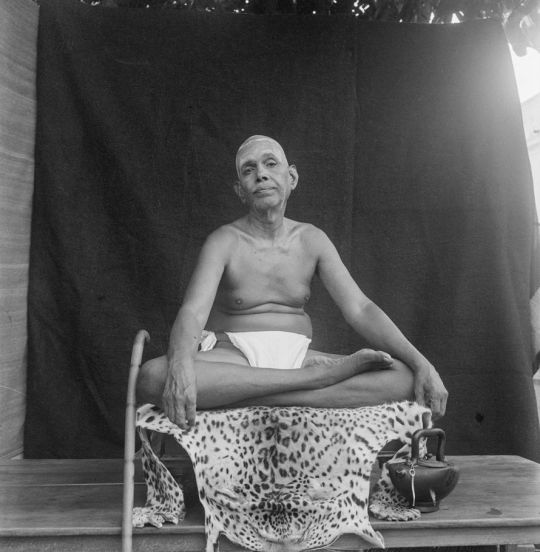
ॐ
O son, always experience non-duality (advaita) in the heart, but do not at any time put non-duality in action. Non-duality is fit to be expressed even with the three Gods, Brahma, Vishnu and Siva in their three worlds, but know that non–duality is not fit to be expressed with the Guru.
ॐ
— Sri Ramanopadesa Noonmalai - Ulladu Narpadu - Anubandham, V.39 pg.155-156 (pdf)
Note : Non-duality (advaita) is the experience in which it is clearly known that all forms of duality such as the mind, body and world are completely non-existent, and that self, the existence-consciousness ‘I am’, alone truly exists. Therefore, since action can be done only in the state of duality, in which the mind and body seem to exist, it is impossible to put non-duality into action. If anyone imagines that he can put non-duality into action, it is clear that he has no true experience of non-duality.
Even though one may go to Brahma-loka and say to Brahma, “You and I are one”, even though one may go to Vishnu-loka and say to Vishnu, “You and I are one”, and even though one may go to Siva-loka and say to Siva, “you and I are one”, one should never say to the Guru, “you and I are one.”
Why? Because although as an individual one may attain the power to create, sustain and destroy the universe, which are the functions of Brahma, Vishnu and Siva respectively, one can never attain the power to destroy the ignorance of others, which is the role of the Guru.
Even when the Guru has bestowed the experience of non-duality upon a disciple, thereby destroying his individuality and making him one with Himself, such a true disciple will ever continue to pay due respect and honour to the name and form of the Guru, because so long as separate individuals, each having a body and mind of his own, the differences between them will seem to exist. Therefore, even the disciple who has known the Reality, and who thus experiences in the heart that he is one with the Guru, will always behave outward as a humble slave of the Guru, thereby setting a worthy example for other disciples to follow.
This verse was composed by Sri Bhagavan on 16th February 1938 and is a translation of verse 87 of Sri Adi Sankara’s Tattvopadesa.
✨✨✨✨
Brahma-loka: That part of the many-layered universe that is the realm of pious celestial spirits.
🕉
#Bhagavan Sri Ramana Maharshi#Ulladu Narpadu: Anubandham#Reality in Forty Verses-Supplement#UNAnubandham v.39#UNA v.39#Guru#Sadguru#Sage#non-duality#advaita#self#existence-consciousness ‘I am’#association with sages#God-soul-world#loka#Sri Adi Sankara’s Tattvopadesa
11 notes
·
View notes
Photo

Om Namo Bhagavate Sri Arunachalaramanaya 🕉️ That in which all these worlds (seem to) exist steadily, that of which all (these worlds are a possession), that from which all these worlds rise, that for which all these exist that by which all these worlds come into existence, and that which indeed is all these - That alone is the existing Reality (or sat-vastu). Let us cherish that Self, which is the Reality, in the heart. ~ Ulladu Narpadu - Anubandham (Reality in Forty Verses - Supplement), https://www.instagram.com/p/CR63szELLIhymUSARSCC52EZOPtsuUjusjuUek0/?utm_medium=tumblr
1 note
·
View note
Quote
Know that for people of little learning, others such as children and wife form (only) one family, (Whereas) in the minds of those who have vast learning there are not one but many families (in the form) of books as obstacles to yoga (spiritual practice).
Reality in Forty Verses - Supplement (Ulladu Narpadu - Anubandham), V. 34
✨✨✨
Note : The attachment to endless book-knowledge and the pride which results from such knowledge, are a far greater obstacle to the subsidence of the ego than the attachment which an ordinary person has, towards his wife and children.
✨✨✨
11 notes
·
View notes
Photo
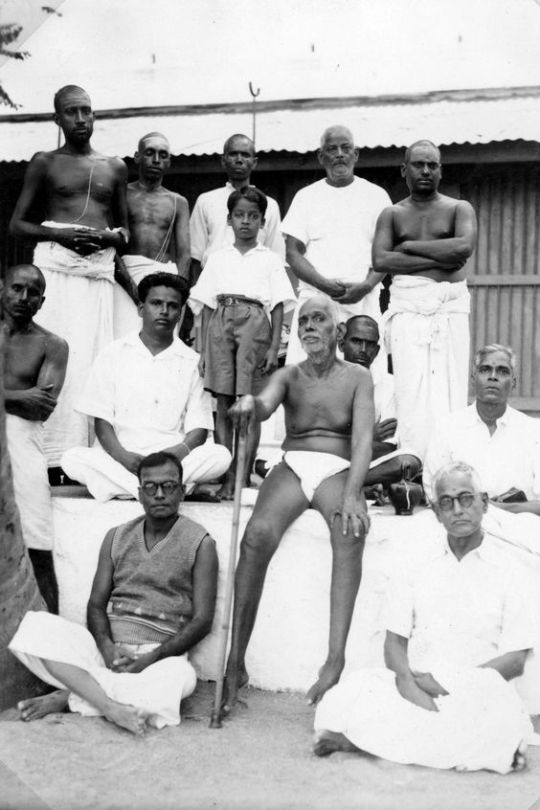
When one always abides unswervingly in one’s own state (the state of Self) without knowing (any differences such as) ‘oneself’ and ‘others’, what (does it matter) if who says what about one self? Even if one praises or even if one disparages oneself, what (does it matter)? (Because in that state of Self-abidance) who is there other than oneself?
~ Reality in Forty Verses - Supplement (Ulladu Narpadu - Anubandham), V.38
This verse was composed by Sri Bhagavan for K.V. Ramachandra Aiyar.
Note :
The desire for being praised and the dislike of being disparaged, which are two sides of one coin, can be overcome perfectly only when one knows and abides as Self.
So long as the ego, the ‘I am the body’ – identification survives, one cannot but be affected in some way or other when one is praised or disparaged. See ‘Sri Ramana Sahasram’ verse 168.
But in the non-dual state of self-abidance, in which the ego or individuality has been destroyed, one does not experience any sense of otherness-that is, one does not feel any such distinction as ‘This is me, that is someone else’ – and hence if one is praised or disparaged by ‘others’ it is as if one is praised or disparaged by oneself. In other words, since the Jnani knows that He alone exist, His perfect equanimity cannot be distrurbed even in the least by either praise or disparagement.
🕉️
#Bhagavan Sri Ramana Maharshi#Ulladu Narpadu: Anubandham#UNAnubandham v.38#Reality in Forty Verses-Supplement#defects#renunciation#desire for praise#desire for fame#desire for honor#desire for relationship#desire for possession#desire for appreciation by others#likes and dislikes#praise or disparagement
10 notes
·
View notes
Photo

Photo by Dev Gogoi “ . . . and then, around the bend, unexpectedly, a vision . . .“
🌺
Know that luster and power of intellect will
automatically increase in those who have known the Reality,
like the trees on this earth shining forth with all qualities
such as beauty as soon as spring comes.
🌺
~ Ulladu Narpadu - Anubandham (Reality in Forty Verses - Supplement), V.29
Note : This verse is adapted from Yoga Vasishtha 5,76,20.
🌺
10 notes
·
View notes
Photo
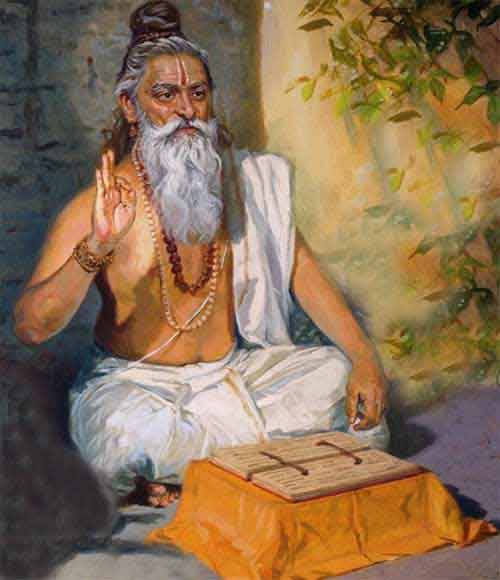
🕉️
Vasishtha continued:
“O Hero, being one who has seeming mental excitement (or rising) and joy, being one who has seeming mental anxiety and hatred (anger), being one who has seeming effort or initiative but being as one who is (in truth) devoid of (all such) defects, play (your role) in the world.
O Hero, being one who has been released from the many bonds called delusion, being one who is firmly equanimous in all conditions, (yet) outwardly doing actions appropriate to (your) disguise, play (your role) in the world."
~ Ulladu Narpadu - Anubandham (Reality in Forty Verses - Supplement), V. 27
This Verse is adapted from Yoga Vasishta 5.18.24 and 26.
🕉️
14 notes
·
View notes
Photo
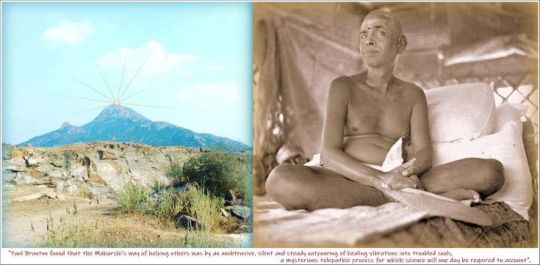
The silence of the Sage
Paul Brunton found that the Maharshi’s way of helping others was by an unobtrusive, silent and steady outpouring of healing vibrations into troubled souls, a mysterious telepathic process for which science will one day be required to account.
(Image source: Pinterest: Canta Dadlaney)
ॐ
I shall truly declare the essence of the established conclusion of all Vedanta (Sarva-Vedanta-Siddhanta-Sara). If ‘I’ (the ego) dies and ‘I’ (the real self) is (found to be) That (the absolute reality), know that ‘I’ (the real self), which is the form of consciousness, alone-will be what remains.
~ Ulladu Narpadu - Anubandham (Reality in Forty Verses - Supplement), V. 40
ॐ
Note :
Since verses 9, 25 and 40 of this Anubandham were originally composed by Sri Bhagavan as a separate three-verse poem it is fitting to read these three verses together.
“If the ego, which is the embryo, comes into existence, everything (the entire world of duality) will come into existence.
If the ego does not exist, everything will not exist, (Hence) the ego itself is everything——”
says Sri Bhagavan in verse 26 of Ulladu Narpadu. Therefore, when the ego is destroyed by self-knowledge, all forms of duality – the mind, body and world – will cease to exist, and the non-dual real self, whose form is Existence Consciousness-Bliss, alone will remain. Such is the final and established conclusion of all Vedanta, as confirmed by the experience of Bhagavan Sri Ramana.
✨✨✨✨
#Bhagavan Sri Ramana Maharshi#Ulladu Narpadu: Anubandham#Reality in Forty Verses-Supplement#UNAnubandham v.40#UNA v.40#non-duality#advaita#self#existence-consciousness ‘I am’#Hridaya Heart Centre#Heart lotus#vichara#atma-vichara#Who am I?#Self-enquiry#Self-Investigation#sphurana 'I-I'#adjunctless consciousness ‘I’#extinguishment of thought#state devoid of thought#annihilation of the mind
8 notes
·
View notes
Quote
Rather than those who have no humility (literally, those who have not subsided) though learned, the unlearned indeed are saved. They are saved from the demon of pride which possesses (those who are learned); they are saved from the disease of countless whirling thoughts; and they are saved from running in search of glory (fame or wealth). (Therefore) know that, that from which they are saved is not (only) one (evil, but many).
Reality in Forty Verses - Supplement (Ulladu Narpadu - Anubandham), V. 36
🕉️
Note : This verse is composed on the same lines as verse
277 of Naladiyar, an ancient tamil work consisting of 400
venbas on moral conduct.
🕉️
#Bhagavan Sri Ramana Maharshi#Ulladu Narpadu: Anubandham#Reality in Forty Verses-Supplement#UNAnubandham v.36#defects#karma vibhakti viyoga ajnana#renunciation#desire for praise#desire for fame#desire for honor#desire for relationship#desire for possession#desire for appreciation by others
7 notes
·
View notes
Photo

🕉️
For those who do not intend to destroy the letters (of destiny) by scrutinizing where they were born who have learnt the letters (of the scriptures), what is the use of (their) having learnt (those) letters? They have (merely) acquired the nature of a sound-recording machine. Say, O Sonagiri (Arunachala), the knower (of reality), who else (are they but mere sound-recording machines)?
~ Reality in Forty Verses - Supplement (Ulladu Narpadu - Anubandham), V. 35
🕉️
Note: The writings of destiny or prarabdha, can be destroyed for ever only by destroying the ego, the experiencer of prarabdha. The only purpose of reading the letters of the scriptures is to learn the path by which one can destroy the ego, and to strengthen in one the liking to destroy the ego. Therefore those who have no intention to destroy the ego learning the letters of the scriptures will be of no use. Instead of attaining the egoless state of self abidance, such people will only attain the proud state of being able to repeat whatever they have learnt like a sound – recording machine.
✨✨✨

#Bhagavan Sri Ramana Maharshi#Reality in Forty Verses-Supplement#Ulladu Narpadu: Anubandham#UNAnubandham v.35#book-knowledge#scriptures knpwledge#prarabdha#destiny
7 notes
·
View notes
Photo
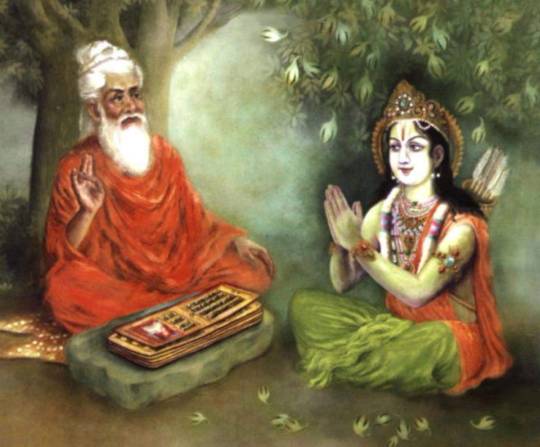
🕉️
Vasishtha said to Rama:
“O Hero, having enquired into all the states, which are of various kinds, play (your role) in the world always clinging firmly with the mind only to that one which is the supreme state devoid of unreality. O Hero, since you have known that (Self) which exists in the heart as the Reality of all the various appearances; therefore without ever abandoning that outlook, play (your role) in the world as if (you have) desire”.
~ Ulladu Narpadu - Anubandham (Reality in Forty Verses - Supplement), V. 26
Note:
“All the states” mentioned at the beginning of this verse may mean all the states of consciousness such as waking, dream and sleep, or all the conditions of life such as youth, old age, health, sickness, wealth, poverty, fame, ill-fame, joy, suffering and so on. All these different states or conditions are based only upon the feeling ‘I am this body’, ‘I am so-and-so’, I am an individual being’. “The supreme state devoid of unreality” mentioned in the same sentence is the state of Self-abidance, which is completely devoid of that unreal feeling ‘I am this body’.
“That outlook” mentioned in the second half of this verse is the true outlook (drishti) in which Self is experienced as the sole reality underlying the appearance of the world and of all the various states, and conditions.
This verse is adapted from Yoga Vasishtha 5.18.20 and 23.
🕉️
#Bhagavan Sri Ramana Maharshi#Ulladu Narpadu: Anubandham#UNAnubandham v.26#sleep dream waking states#Self-abidance#atma-nishta#abidance as reality#atma-vichara#vichara#self-investigation#self-enquiry#who am i?#Yoga Vasishta
10 notes
·
View notes
Photo

🌟
Just like one who is (seemingly) listening to a story when (his) mind has (in fact) gone far away, the mind (of the Atmajnani or knower of self) in which the tendencies (vasanas) have been erased, has not (in fact) done (anything) even though it has (seemingly) done (many things).
(On the other hand) the mind (of an ajnani or one who does not know Self) which is saturated with them (tendencies or vasanas), has (in fact) done (many things) even though it has (seemingly) not done (anything), (just like) one who (thinks) in dream (that he) has climbed a hill and is falling over a precipice, even though (his body is in fact lying) here without movement (sleeping on his bed).
🌟
~ Ulladu Narpadu - Anubandham (Reality in Forty Verses - Supplement), V.30 (pdf)
This verse is adapted from Yoga Vasishtha 5.56.13 and 14.
🌟
9 notes
·
View notes
Photo

🕉️
Proclaim that He who has conquered the senses by knowledge (jnana) and who abides as existence-consciousness, is a knower of Self (atma-vid); (He) is the fire of knowledge (jnanagni); (He is) the wielder of the thunderbolt of knowledge (jnana-vajrayudha); He, the destroyer of time (kala-kala), is the hero who has killed death.
~ Ulladu Narpadu - Anubandham (Reality in Forty Verses - Supplement), V.28
Note : The Atma-jnani is not merely an incarnation of any particular God; The Jnani is Jnana itself, and hence, He is the reality of all Gods such as Agni, Indra, and Lord Siva.
Since the Jnani burnt ignorance (ajnana) to ashes, He is Himself the fire of knowledge (jnanagni). And since, having given up the identification with the body, which is limited by time and subject to death, He shines as the timeless and deathless Self, He is Himself Lord Siva, the destroyer of time (kalakalan) and the killer of death.
Since the Jnani has conquered the senses, through which the appearance of the universe is projected, He has in truth conquered the whole universe. Therefore, since there is no power in the entire universe greater than the power of the Jnani’s firm Self-abidance, His self-abidance is described as the thunderbolt of knowledge (jnana-vajrayudha).
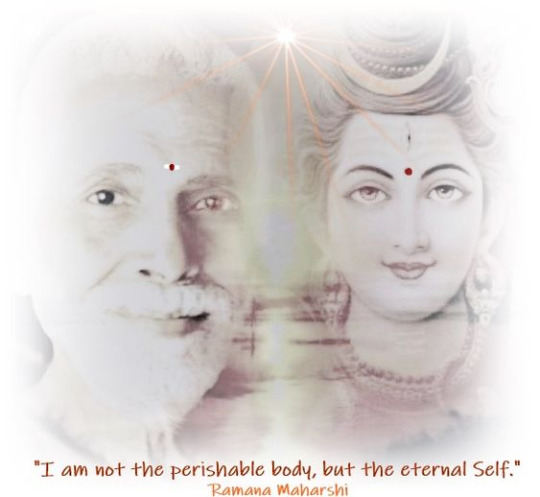
🕉️
Images from Pinterest
#Bhagavan Sri Ramana Maharshi#Ulladu Narpadu: Anubandham#UNAnubandham v.28#Self-abidance#atma-nishta#abidance as reality#thunderbolt of knowledge#jnana-vajrayudha
5 notes
·
View notes
Photo
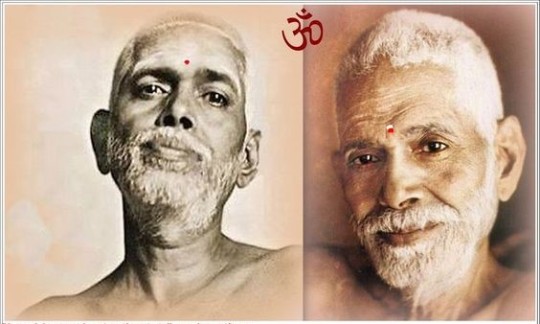
O silêncio do Sábio
Paul Brunton descobriu que a maneira de o Maharshi ajudar os outros era por um derramamento discreto, silencioso e constante de vibrações de cura sobre as almas atribuladas, um processo telepático misterioso, o qual será necessário a ciência um dia ter em consideração.
ॐ
Declaro com todo o rigor a essência da conclusão consagrada de todo Vedanta (Sarva-Vedanta-Siddhanta-Sara). Se o 'eu' (ego) morrer e (se descobrir que) o 'Eu' (o Eu real) é Aquilo (a realidade absoluta), saiba que 'Eu' (o eu real), que é a forma da consciência, sozinho-é o que permanecerá.
~ Ulladu Narpadu - Anubandham (A Realidade em Quarenta Versos - Suplemento), V. 40
ॐ
Nota :
Como os versículos 9, 25 e 40 deste Anubandham foram originalmente compostos por Sri Bhagavan como um poema separado de três versos, é apropriado ler estes três versículos em conjunto.
Sri Bhagavan diz no versículo 26 de Ulladu Narpadu:
“Se o ego, que é o embrião, vier à existência, tudo (o mundo inteiro da dualidade) virá à existência.
Se o ego não existir, tudo não existirá, (portanto) o próprio ego é tudo——”
Portanto, quando o ego for destruído pelo auto-conhecimento, todas as formas de dualidade – a mente, o corpo e o mundo – deixarão de existir, e o eu real não-dual, cuja forma é Consciência de Existência-Bem-aventurança, é o que sozinho permanecerá. Tal é a conclusão final e consagrada de todo Vedanta, conforme confirmado pela experiência de Bhagavan Sri Ramana.
✨✨✨✨
#Bhagavan Sri Ramana Maharshi#Ulladu Narpadu: Anubandham#A Realidade em Quarenta Versos - Suplemento#UNAnubandham v.40#UNA v.40#não-dualidade#advaita#Ser#EU SOU#existência-consciência#Hridaya Coração Centro#coração de lotus#vichara#atma-vichara#Quem sou eu?#Auto-investigação#Auto-inquirição#sphurana 'Eu-Eu'#consciência 'Eu' sem adjuntos#pura consciência 'Eu'#estado livre de pensamento#extinção do pensamento#aniquilação da mente
4 notes
·
View notes
Text
🕉️
Ao contrário daqueles que não têm humildade (literalmente, aqueles que não se submergiram), embora instruídos, os incultos certamente são salvos. Eles são salvos do demónio do orgulho que possui (os que são instruídos); eles são salvos da doença de incontáveis pensamentos rodopiantes; e eles são salvos de correr em busca de glória (fama ou riqueza). (Portanto) saiba que, aquilo do qual eles são salvos não é (apenas) um (mal, mas muitos).
— A Realidade em Quarenta Versos - Suplemento (Ulladu Narpadu - Anubandham), V. 36
🕉️
Nota: Este versículo é composto nas mesmas linhas do verso
277 de Naladiyar, uma antiga obra do Tâmil composta por 400
venbas sobre a conduta moral.
#Bhagavan Sri Ramana Maharshi#Ulladu Narpadu: Anubandham#A Realidade em Quarenta Versos - Suplemento#UNAnubandham v.36#defeitos#renúncia#karma vibhakti viyoga ajnana#desejo de honra#desejo de fama#desejo de elogio#desejo de relacionamento#desejo de posses#desejo de apreciação pelos outros
2 notes
·
View notes
Photo

🕉️
Para aqueles que não pretendem destruir as letras (do destino) perscrutando onde nasceram eles que aprenderam as letras (das escrituras), de que adianta terem aprendido (aquelas) letras? Eles (meramente) adquiriram a natureza de um gravador de som. Diga, ó Sonagiri (Arunachala), o conhecedor (da realidade), quem mais (são eles senão meras máquinas de gravação de som)?
— A Realidade em Quarenta Versos - Suplemento (Ulladu Narpadu - Anubandham), V. 35
🕉️
Nota: Os escritos do destino ou prarabdha, podem ser destruídos para sempre apenas destruindo o ego, o experimentador de prarabdha. O único propósito de ler as letras das escrituras é aprender o caminho pelo qual se pode destruir o ego, e fortalecer em nós o gosto de destruir o ego. Portanto, para aqueles que não têm intenção de destruir o ego, será em vão aprender as letras das escrituras. Em vez de atingir o estado de auto-observação sem ego, essas pessoas apenas atingirão o estado orgulhoso de serem capazes de repetir tudo o que aprenderam como uma máquina de gravação de som.
✨✨✨

#Bhagavan Sri Ramana Maharshi#Ulladu Narpadu: Anubandham#A Realidade em Quarenta Versos - Suplemento#UNAnubandham v.35#destino#prarabdha#conhecimento livresco#conhecimento das escrituras
3 notes
·
View notes
Text
Saiba que, para pessoas de pouco aprendizado, outros como filhos e esposa formam (apenas) uma família, (Enquanto) na mente daqueles que têm vasto aprendizado não há uma, mas muitas famílias (na forma) de livros como obstáculos ao yoga (prática espiritual).
— A Realidade em Quarenta Versos - Suplemento (Ulladu Narpadu - Anubandham), V. 34
✨✨✨
Nota: O apego ao conhecimento infinito dos livros e o orgulho que resulta de tal conhecimento são um obstáculo muito maior para o abatimento do ego do que o apego que uma pessoa comum tem por sua esposa e filhos.
✨✨✨
#Bhagavan Sri Ramana Maharshi#Ulladu Narpadu: Anubandham#UNAnubandham v.34#conhecimento livresco#apego
2 notes
·
View notes